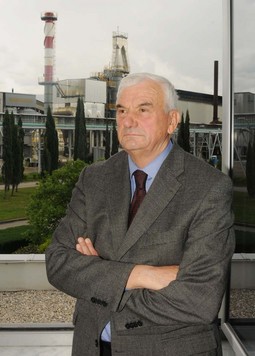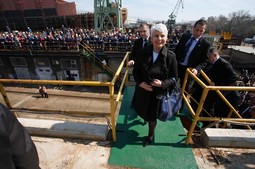Published in Nacional number 757, 2010-05-18
A NEW tentacle in the corruption octopus
Sanader concocted the privatisation of TLM
THE DECISION to privatise TLM was made by Sanader one year prior to the holding of a public tender; it was an elaborate plan within a massive, corrupt financial scam
 Former Prime Minister Ivo Sanader and former Deputy Prime Minister Damir Polancec jointly deceived government so that TLM would end up in the hands of Sanader's friendsAccording to sources close to the investigation, Nacional has discovered that former Deputy Prime Minister Damir Polancec continues to reject offers to cooperate with investigators. Instead of possibly helping to shed some light on the HEP affair, in which he is the primary suspect, Polancec is obviously continuing with his strategy of attempting to scare off the Prime Minister and members of Government, through his lawyer Ante Nobilo. From Nobilo's public messages, his theatrics with shirts bearing the phrase "Where Jadranka goes, I go," and publicly releasing documents which show that the then Deputy Prime Minister Jadranka Kosor signed the decision to sell the TLM light metals factory to Adrial, a domestic consortium, it is clear that Damir Polancec is using all avenues in an attempt to send the Croatian Government a message that the investigation into his dealings be stopped.
Former Prime Minister Ivo Sanader and former Deputy Prime Minister Damir Polancec jointly deceived government so that TLM would end up in the hands of Sanader's friendsAccording to sources close to the investigation, Nacional has discovered that former Deputy Prime Minister Damir Polancec continues to reject offers to cooperate with investigators. Instead of possibly helping to shed some light on the HEP affair, in which he is the primary suspect, Polancec is obviously continuing with his strategy of attempting to scare off the Prime Minister and members of Government, through his lawyer Ante Nobilo. From Nobilo's public messages, his theatrics with shirts bearing the phrase "Where Jadranka goes, I go," and publicly releasing documents which show that the then Deputy Prime Minister Jadranka Kosor signed the decision to sell the TLM light metals factory to Adrial, a domestic consortium, it is clear that Damir Polancec is using all avenues in an attempt to send the Croatian Government a message that the investigation into his dealings be stopped.
This desire of his is not surprising because, according to Nacional's information, the entire case involving the privatisation of the Sibenik-based TLM seriously compromises his position. Furthermore, former Prime Minister Ivo Sanader also played a key role in the suspicious privatisation, a case that will be of vital importance in shedding some light on the HEP affair. This past weekend Nacional acquired information that directly implicates precisely Sanader and Polancec: the entire privatisation of TLM, meaning the decision to put the former industrial giant from Sibenik into the hands of domestic companies close to Sanader was made by Sanader personally, and it was made a full year prior to the holding of a public tender for the sale of TLM shares.
One of the key pieces of evidence to prove this could be the official visitors log book from Government house, from which it can be established that as early as 2006 the then owner of the Mostar-based Aluminij company Mijo Brajkovic, the director of TLM Ivan Kostan as well as members of the Adrial consortium - the director of Dalekovod Luka Milicic, the owner of Konstruktor Zeljko Zderic and the top person at Zagreb-Montaza Vlado Covic, were holding secret meetings in Sanader's cabinet. In order to see this secret plan of assuming control of TLM and rejecting any other potential foreign investors through to its end, Damir Polancec falsified a number of documents regarding the sale of TLM allowing Sanader and himself to jointly deceive their party colleagues - first within the HDZ (Croatian Democratic Union) presidency in January of 2007, and then in Government itself, which decided on the matter entirely on the basis of documents that showed a false picture of TLM and favoured the position that would see TLM fall into the hands of Sanader's friends. Given that each step further in the investigation uncovers the suspicious activities of Ivo Sanader and Damir Polancec, it is clear that the strategy employed by Polancec's attorney Ante Nobilo for a number of days now, consists of efforts to scare Jadranka Kosor and all other members of her cabinet and the HDZ presidency, suggesting that they were all well aware of the process of the TLM privatisation. But it appears that no one has been scared off by Nobilo's perfidious messages.
Just last Friday Vladimir Seks and Andrija Hebrang publicly stood in defence of Prime Minister Kosor, and on Saturday she herself said that she did not wish to influence the ongoing investigation, regardless of the various forms of pressure being applied by some of those suspected. In her address she confirmed that she had signed the Government decision regarding the sale of TLM, explaining that the signing of such a document was a pure formality, adding significantly that she had done so at the request of Ivo Sanader. Anyone who understands how Government functions is well aware of the fact that during Ivo Sanader's mandate, while he was away on official visits an so forth, various documents would arrive on the table of the then Deputy Prime Minister which she would sign in his absence.
Instead of the signature on a formal Government decision, it is more important to focus on how the sale of TLM to the domestic Adrial consortium came about. According to Nacional's sources close to the investigation, key decisions regarding the privatisation of TLM were actually directly agreed upon in 2006 and 2007 in Ivo Sanader's cabinet, and his subordinate Damir Polancec obediently implemented Sanader's instructions in the Croatian privatisation fund. From today's perspective it seems as though both Sanader and Polancec were well aware of the numerous possible implications of the disputed privatisation, so they attempted to create their own version of a political alibi as early as 2007, when at their insistence the issue of the privatisation of TLM and the Split Ironworks was discussed at a meeting of the HDZ presidency, despite the fact that the presidency had never before discussed such issues. At this session the other members in attendance had no other recourse but to support that which Sanader and Polancec presented them. Sanader constantly emphasized "strategic Croatian interests," while Polancec was waving around documents put together by teams of experts from the Croatian privatisation fund at his orders and under his direct control. At the time members of the HDZ presidency probably could not have even imagined that Polancec had deceived them.
 THE FORMER OWNER of Mostar-based Aluminij Mijo Brajkovic was a frequent guest of Sanader's at Government houseThey may have only become aware of this in recent days, or perhaps in early January of last year, when even the State Auditor's office noticed and made a record of a series of irregularities in the privatisation of TLM. According to what Nacional has learned, it was Polancec, in fact, who was most informed as to all of the technical aspects regarding TLM, and it will not be difficult to establish that presentations were written in such a way so as to favour Ivo Sanader's decision to ensure that TLM wind up in the hands of the Adrial consortium.The guideline for investigators in establishing all of the elements of the privatisation of TLM could once again be the official visitors log book from Saint Mark's square. Nacional's sources emphasize that as early as 2006 Ivo Sanader held numerous secret meetings in his cabinet with almost all of the key players involved in the privatisation of Sibenik's TLM factory.
THE FORMER OWNER of Mostar-based Aluminij Mijo Brajkovic was a frequent guest of Sanader's at Government houseThey may have only become aware of this in recent days, or perhaps in early January of last year, when even the State Auditor's office noticed and made a record of a series of irregularities in the privatisation of TLM. According to what Nacional has learned, it was Polancec, in fact, who was most informed as to all of the technical aspects regarding TLM, and it will not be difficult to establish that presentations were written in such a way so as to favour Ivo Sanader's decision to ensure that TLM wind up in the hands of the Adrial consortium.The guideline for investigators in establishing all of the elements of the privatisation of TLM could once again be the official visitors log book from Saint Mark's square. Nacional's sources emphasize that as early as 2006 Ivo Sanader held numerous secret meetings in his cabinet with almost all of the key players involved in the privatisation of Sibenik's TLM factory.
Frequent visitors to the seat of government included Mijo Brajkovic, the former director of Mostar's Aluminij factory, as well as the recently arrested director of TLM, Ivan Kostan. At the time Ivo Sanader was also frequently in the company of Dalekovod director Luka Milicic, the owner of the Konstruktor company Zeljko Zderic and the top man at the Zagreb-Montaza company, Vlado Covic. The latter three, together with the Alu Flex Pack company, which is owned by Hypo Alpe Adria bank, Franck and Kras, as well as the Siroki Brijeg-based company Feal, had created a consortium early in the summer of 2005 that immediately became interested in the purchase of the TLM pressing facility.
In the meantime a decision was adopted that TLM would not be sold in increments and even under this condition there was still interest among foreign investment groups from Russia, Austria, Slovakia and Spain as late as in February of 2006, and there was even a rumoured interest from China. Regardless of the serious interest among foreign investors, it is clear that by mid 2006 a deal had been reached by the heads of the domestic consortium and Ivo Sanader that TLM would wind up in their hands, but in an effort to give the entire process an air of legitimacy a direct deal was avoided. It was therefore left to Damir Polancec to push through the operational end of this privatisation farce, essentially a public tender for which the winner was determined well in advance.
Thus on September 1st the Croatian government assigned the Croatian Privatisation Fund with the task of issuing a public tender for the purchase of TLM, while Deputy Prime Minister Damir Polancec with his peculiar hype appeared to be attempting to publicly ward off any potential investors. "It is difficult to expect that any relevant offers will be submitted in the first round of the tender given that the shares are being sold at their full price. Precisely because of that the deadline for submitting bids will be 15 days from the issue of the tender, the real bids are expected only in the third round," Polancec said at the time. Naturally the tender failed.
In early January of 2007 a decision was adopted regarding a tender under special conditions, or in other words "for one kuna." In the meantime, in the privatisation fund, documents were prepared that clearly favoured the domestic Adrial consortium.
Evidence for the very suspicious preparations for the privatisation of TLM lie in the report of the State Auditor's Office for 2007, in which Sima Krasic and her colleagues established that it was entirely unclear how the selling price for TLM shares was reached. Similarly, it was discovered that TLM management had delivered incorrect data to the privatisation fund, on the basis of which an estimate of the company's worth was issued. The audit showed that according to the reports submitted by the company's management, losses for the 2003-2005 period were 508.2 million kuna, which is 53 million kuna or 11.7 percent more than the losses recorded in the financial reports register. Finally, the audit concludes that in the TLM case initial preparations for the sale and establishing of restructuring measures were not executed, which they believe would have resulted in a higher sale price.
All of these details worked in the favour of the future buyers of TLM, which definitely opens up the possibility that someone within TLM or the privatisation fund had deliberately favoured the Adrial consortium. The epilogue of the privatisation of TLM is clear: in March of 2007 two bids were opened. The first was from the domestic consortium, while the second was from the Lithuanian UBIG (Ukio Banko Investicine Groupe), which had demonstrated its serious intentions with regards to investing into the region when it bought the Birac Alumina plant in Zvornik in Bosnia Herzegovina. The regular procedure at public tenders was that after the opening of the bids experts from the privatisation fund would draw up an analysis of the bids and offer their suggestion as to the best submitted bid.
Given that it was quickly established that the Lithuanian bid was much better, Damir Polancec set another precedent - he directly ordered the president of the public tenders office at the Croatian Privatisation Fund that in the case of TLM the team of experts prepare an analysis of the bids but not offer their suggestion as to which bid to accept.
Furthermore he ensured through various methods that the Lithuanian bid was not presented realistically. He then used doctored data and documents to convince the board of the Croatian Privatisation Fund to go with the bid submitted by the Croatian consortium, and he then used these same data points to deceive his colleagues in Government, who had no way of knowing that the Deputy Prime Minister was knowingly deceiving them. The only one who was aware of this was the man who had one year earlier promised his friends from the domestic consortium that despite the procedural "nuisance" of a public tender, the Sibenik-based TLM factory would end up in their hands.
This in the end proved to be true. All the events that occurred after this could also be of interest to USKOK (The Bureau for the Prevention of Corruption and Organized Crime) investigators. On April 19th 2007, at a closed session, Croatian Government confirmed the decision to sell TLM shares to the Adrial consortium. This was followed by many months of negotiations regarding the specifics and details, with Government only adopting the final text of the contract of sale on December 7th 2007.
 Polancec wants to stop the investigation by making public documents from which it is clear that Jadranka Kosor signed the decision on TLMAccording to some sources, it was precisely this period of time that was key in reaching an agreement regarding the preferential treatment of the buyer, of which the Croatian public, as with many other cases, knows nothing about. By all accounts it was precisely at this time that the Adrial consortium was allegedly promised what former Deputy Prime Minister Damir Polancec is currently suspected of - cheap electricity which travelled from HEP to TLM in Sibenik and then to Aluminij in Mostar. The cost of this "successful" privatisation and the business results of these companies years later, were paid by and will continue to be paid by the Croatian taxpayer.
Polancec wants to stop the investigation by making public documents from which it is clear that Jadranka Kosor signed the decision on TLMAccording to some sources, it was precisely this period of time that was key in reaching an agreement regarding the preferential treatment of the buyer, of which the Croatian public, as with many other cases, knows nothing about. By all accounts it was precisely at this time that the Adrial consortium was allegedly promised what former Deputy Prime Minister Damir Polancec is currently suspected of - cheap electricity which travelled from HEP to TLM in Sibenik and then to Aluminij in Mostar. The cost of this "successful" privatisation and the business results of these companies years later, were paid by and will continue to be paid by the Croatian taxpayer.
Related articles
Sanader’s eight fear SDP — Won’t bring down Government
Despite forecasts that he would, former Croatian Prime Minister Ivo Sanader, who recently took his seat in Parliament, will not work from the house… Više
Latest news
-
28.10.2010. / 14:15
'A profitable INA is in everyone's interest'
-
28.10.2010. / 09:38
Sanader’s eight fear SDP — Won’t bring down Government
-
21.10.2010. / 15:02
Interior Ministry turned a blind eye on Pukanic assassination
-
20.10.2010. / 09:34
Barisic could bankrupt HDZ




